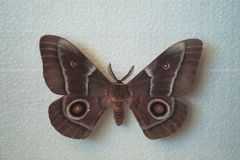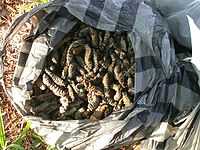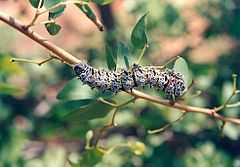Gonimbrasia belina
| Gonimbrasia belina | |
|---|---|
 | |
| Mopane worm atop a mango leaf | |
| Scientific classification | |
| Kingdom: | Animalia |
| Phylum: | Arthropoda |
| Class: | Insecta |
| Order: | Lepidoptera |
| Family: | Saturniidae |
| Genus: | Gonimbrasia |
| Species: | G. belina |
| Binomial name | |
| Gonimbrasia belina Westwood, 1849 | |
Gonimbrasia belina is a species of moth found in much of Southern Africa, whose large edible caterpillar, the mopani or mopane worm, is an important source of protein for millions of indigenous Southern Africans.
Vernacular names
The mopane worm is so called in English because it is usually found on the mopane tree, Colophospermum mopane. Other vernacular names for the caterpillars include:
- Botswana
- Kalanga:mashonja
- Setswana: phane
- South Africa
- Sepedi: mašotša (colloq) 1
- Tshivenda: mashonzha
- Xitsonga: matamani or masonja""
- Zambia
- Zimbabwe
- Ndebele: macimbi
- Shona: madora, masodya or mashonja in Karanga
- Namibia
- Oshiwambo: omagungu
- Democratic Republic of Congo
- Kikongo: mingolo
The Latin name is sometimes given as Imbrasia belina, rather than Gonimbrasia belina. 3
Identification
Moths are large (wingspan 120mm) Wings fawn through shades of green and brown to red, with two black and white bands isolating eye spots. Orange eyespot on each hind wing. Larvae are black, peppered with round scales in indistinct alternating whitish green and yellow bands, and armed with short black or reddish spines covered in fine white hairs. Males have feathery antennae. They use them to find a mate.
Biology
Larvae eat a wide range of plants including Mopane, Carissa grandiflora, Diospyros, Ficus, Rhus, Scleorcarya caffra, Terminalia and Trema. Out breaks defoliate shrubs, depriving game of browse.
Habitat
Widespread. Very common in semi-desert, bushveld and grassland.
Life cycle

Like most caterpillars, the mopane worm's life cycle starts when it hatches in the summer, after which it proceeds to eat the foliage in its immediate vicinity. As the larva grows, it moults 4 times in its 5 larval stages, after which the mopane worm is considered most desirable for harvesting. Provided that the larva has not been harvested after its fourth moult, it burrows underground to pupate, the stage at which it undergoes complete transformation to become the adult moth. This stage happens over winter, for a duration of 6 to 7 months, whereafter it emerges at the beginning of summer (November or December).
The adult moths live only for three to four days, during which time they seek to mate and lay their eggs.
Predators
Like many animals lower down on the food chain, the mopane worms and their eggs often fall prey to various predators as well as disease. Often, more than 40% of a mopane worm's eggs will be attacked by various parasites, and the caterpillars themselves are susceptible to infection from a virus that has a high mortality rate. The worms' main predators are various birds and humans, who rely on the caterpillars for sustenance.
Diet
Although the mopane worm feeds chiefly on the mopane tree, it is not limited to this diet, and can feed on many other trees that are indigenous to the same regions as that tree, including the leaves of the mango tree. Thus the mopane worm is scattered over a fairly large area, as it is not restricted to areas with mopane trees. As the larval stage of the mopane worm is fairly short, in contrast to other browsing caterpillars, the extensive damage to foliage is easily survived by the tree, in time to be replenished for the next generation of mopane worms. Like most caterpillars, the mopane worm is a voracious eater, and will continue to eat - almost non-stop - until it reaches the next stage of its life cycle, when it burrows underground to undergo metamorphosis.
As food
Mopane worms are hand-picked in the wild, often by women and children. In the bush, the caterpillars are not considered to belong to the landowner (if any), but around a house permission should be sought from the resident. Chavanduka describes women in Zimbabwe tying a piece of bark to particular trees to establish ownership, or moving the young caterpillars to trees nearer home. 4 When the caterpillar has been picked, it is pinched at the tail end to rupture the innards. The picker then squeezes it like a tube of toothpaste or lengthwise like a concertina, and whips it to expel the slimy, green contents of the gut.
Preserving
The traditional method of preserving mopane worms is to dry them in the sun or smoke them, whereby they gain extra flavour. The industrial method is to can the caterpillars (usually in brine). Tins of mopane worms can be found in rural supermarkets and markets around southern Africa.
Eating
Dried mopane worms can be eaten raw as a crisp snack; however, in Botswana people tend not to eat the head. Alternatively, mopane worms can be soaked to rehydrate, before being fried until they are crunchy, or cooked with onion, tomatoes and spices and then served with sadza.5 The flesh is yellow, and the gut may still contain fragments of dried leaf, which is not harmful to humans. The taste of dried leaves, if not removed, is somewhat reminiscent of tea leaves. Dried mopane worms are frequently canned/packaged in tomato sauce or chili sauce to enhance the flavor.
In popular culture
Food Network ran a promotional spot in which an American husband and wife visit a remote African tribe which fed them mopane worms, which the husband described as tasting like "honey barbecued chicken." Later, the headman of the village is a guest of the American couple, who serves him honey barbecued chicken; the headman describes it (in his native language, subtitled in English) as tasting "just like mapani [sic] worms."
In the TV show The No. 1 Ladies' Detective Agency, one of the characters is going on surveillance, and is brought bush tea and mopane worms as an alternative to coffee and donuts.
Farming and economics
The harvesting and sale of mopane worms is a multi-million rand industry in southern Africa.6 The principal producers are Botswana, Namibia, South Africa (Limpopo Province and Mpumalanga) and Zimbabwe. Typically, the caterpillars are not domesticated, and are picked wherever they occur naturally. It is one of the region's most economically important insects. In the 1990s, hundreds of tons were exported from Botswana and South Africa each year. 7 It is estimated that South Africa alone trades 1.6 million kilogrammes of mopane worm annually, 8 and that Botswana's involvement in this industry nets it roughly $8 million annually. 11
Mopane worms are considered to be a profitable harvest, as a mere three kilograms of feed (mopane leaves) will generally yield one kilogram of mopane worms: in contrast, cattle farming requires ten kilograms of feed to generate one kilogram of beef; thus the worms are a low-cost, low-maintenance, high-protein food source.8
Harvesting

Traditionally, mopane worms were harvested for subsistence. Because of the seasonal nature of the occurrence of these edible caterpillars, they are not a year-round food source. However, traditional mopane worm harvesting is evolving to be more commercially-driven.
Since the 1950s, commercial farming methods have been applied to the mopane worm harvests, particularly in South Africa. Collectors may organise teams of hundreds of people to hand-pick the caterpillars from the trees, after which they are bagged en masse, weighed, and sent off to be processed. Owners of land where mopane worms are found may charge harvesters large fees to enter. Whereas this relationship profits both the commercial harvester and the farmer, it is often to the detriment of the local community for whom the caterpillars may previously have been an important source of food and seasonal income.
Sustainability
As mopane worms represent an important sector in the local rural economy, they attract large numbers of people who seek to cash in on the profits from selling the insects as food. This circumstance leads to overharvesting, and fewer mopane worms the following year. In some areas, farmers and communities have taken steps to reach a balance, so that each year may yield maximum returns without compromising the following year's harvest.
Fears of competition

A sure sign of the presence of mopane worms is defoliation of mopane woodland - sometimes around ninety per cent of leaves.8 Fenced-in browsing animals may rely on the mopane, and on other trees favoured by the caterpillars, as an important part of their diet. Some farmers therefore view the mopane worm as competition for their livestock, and attempt to eradicate the "pest" with insecticides and the like. However, the caterpillar season is short, and the trees sprout the new, tender foliage which browsers prefer, so this problem can be managed in other ways, for example, by working to mutual benefit with the local caterpillar harvesters.9
Recolonisation
Some areas once rich in mopane worms are now barren due to over-harvesting and lack of a proper sustainable approach to commercial mopane worm farming. A good case is in Nkayi District, Zimbabwe, where most mopane woodland areas once produced a high population of these worms; but the harvests have decreased drastically. Suggestions of how to reintroduce the worms to these areas include re-colonisation. As the adult moth lives only three to four days, during which it must mate and lay eggs, there is only a small window of opportunity to relocate them. If this stage was to be successfully completed, collaboration with local farmers and communities would be required to ensure that the caterpillars are not harvested for a set number of years. It would thus be ensured that the area is adequately repopulated, so that a sustainable harvest is created for the future.
Domestication
Those in the business have considered domesticating the mopane worms in a manner that is similar to the domestication of silkworms. The industry would thus be less susceptible to the pitfalls that are associated with it, such as climatic change, drought and other factors that could compromise a harvest. For a domesticated industry to succeed on a small scale and be accessible to the poorest of the poor, the cost of production would have to be comparable with the cost of wild worms or dried worms at the market.
Notes and references
- ^1 , ^8 On the trail of missing Mopane Worms. Retrieved 28 March 2006
- ^2 Silow, C.A. 1976. Edible and Other Insects of Mid-western Zambia. Studies in Ethno-entomology II. Occ. Pap. V. Inst.Allm. Jamforand. Etnogr., Uppsala, Sweden: Almqvist & Wiksell, pp. 64–69. (Quoted ch.17 DeFoliart 2003)
- ^3 , ^6 , ^9 The Mopane Worm. Retrieved 28 March 2006.
- ^4 Chavunduka, D.M. 1975. Insects as a source of protein to the African. Rhodesia Sci. News 9: 217-220. (Quoted in ch.13 DeF 2003)
- ^5 Sikunu cookbook. Retrieved 28 March 2006.
- ^7 A Concise Summary of the General Nutritional Value of Insects
- Mopane Worm Life Cycle and Metamorphosis
- Mopane Woodlands and the Mopane Worm
- ^8 Worming your way to a sustainable harvest Spore Brief Iss. 108
- ^11 Effects of Elevated Ultraviolet-B Radiation on Native and Cultivated Plants of Southern Africa
References
- ↑ "Insect and host plant species of Central Africa: scientific names". Fao.org. Retrieved 2011-10-18.
Further reading
- Food Insects Site includes The Food Insects Newsletter
- DeFoliart, Gene. The Human Use of Insects as a Food Resource: A Bibliographic Account in Progress.
External links
| Wikimedia Commons has media related to Mopane worm (Gonimbrasia belina). |
- Homepage of Arne Larsen Photographs of a mopane worm outbreak